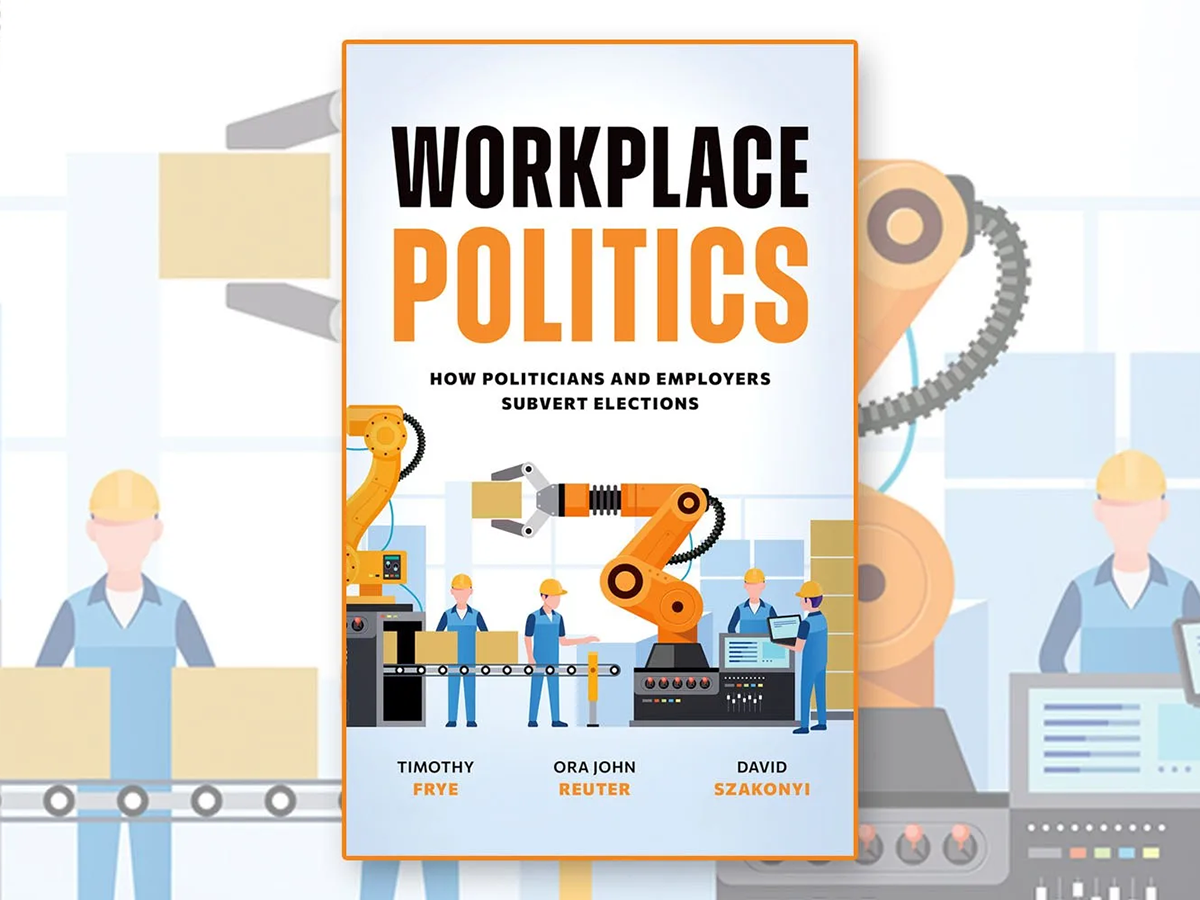Registration REQUIRED by November 13, 2025 to attend this event in-person.
Please join the Harriman Institute, the Institute for Social and Economic Research, The Society of Fellows and Heyman Center for the Humanities, and the Department of Political Science for a celebration of Timothy Frye, Ora John Reuter, and David Szakonyi’s recent work “Workplace Politics: How Politicians and Employers Subvert Elections.” At this event, author Timothy Frye will be joined by panelists V. Page Fortna, Alexander Hertel-Ferenandez, John D. Huber, and Jessica Pisano (The New School).
In many countries, politicians rely on employers to influence the voting behavior of their employees, but this type of voter mobilization is remarkably understudied. “Workplace Mobilization: How Politicians and Employers Subvert Elections” draws on unique surveys of firm managers and employees in eight countries, as well as a wealth of fine-grained observational data and qualitative interviews from Russia to demonstrate that workplace mobilization is common, often coercive, and unpopular with many voters. It argues that when firm managers depend on the state, cannot easily move their assets, or can easily replace workers, politicians can induce employers to get their workers to the polls. In these settings, politicians and employers can use workplace mobilization to diminish voter autonomy, undermine electoral integrity, and skew electoral outcomes in favor of entrenched political groups.
But because workplace mobilization is unpopular in the broader electorate, politicians use this strategy less frequently in information rich settings where voters are likely to learn about it. This book helps explain why countries whose economies are dominated by state interventions in markets, immobile capital, and slack labor markets may be especially prone to clientelism and autocratic rule and contributes to central debates in comparative politics and political economy.
About the Authors
Timothy Frye is the Marshall D. Shulman Professor of Post-Soviet Foreign Policy. His research and teaching interests are in comparative politics and political economy with a focus on the former Soviet Union and Eastern Europe. He writes and teaches about the politics of corruption, autocracy, and economic development, usually with a focus on Russia and Eurasia.
Ora John Reuter is a Professor in the Department of Political Science at the University of Wisconsin–Milwaukee. His research is in the areas of comparative political institutions, authoritarianism, elections, democratization, comparative political economy, and Russian politics.
David Szakonyi is Associate Professor of Political Science at George Washington University, co-Director of PONARS Eurasia, and co-founder of the Anti-Corruption Data Collective. His academic research focuses on corruption, clientelism, and political economy in Russia, Western Europe, and the United States.
About the Speakers
V. Page Fortna is the Harold Brown Professor of U.S. Foreign and Security Policy and Chair in the Department of Political Science. Her research focuses on terrorism, the international politics of climate change, the durability of peace in the aftermath of both civil and interstate wars, and war termination.
Alexander Hertel-Fernandez is the Herbert Lehman Professor of Government in the Faculty of International and Public Affairs at Columbia University. His teaching and research focus on understanding the intersection between politics and markets in the United States, the politics of policy design, and labor policy. He is co-director of Columbia’s Labor Lab, which uses social science tools in partnership with labor organizations to build worker power.
John D. Huber teaches and conducts research with a focus on the comparative study of democratic processes. He published “Exclusion by Elections: Inequality, Ethnic Identity and Democracy,” which develops a theory about how inequality can foster identity politics, which can then limit the propensity of a democracy to respond to inequality. His current projects focus on bureaucracy, civil war, and inter-generational solidarity.
Jessica Pisano is Professor of Politics at The New School for Social Research. She writes and teaches about contemporary and twentieth century politics and political economy in Eastern Europe. Her work focuses on the enclosure of public resources, the constitution of material and social power, and political and social processes of dispossession. She asks how shifts in political economy affect people’s lives, and how those effects translate into changes in local, national, and global politics.


